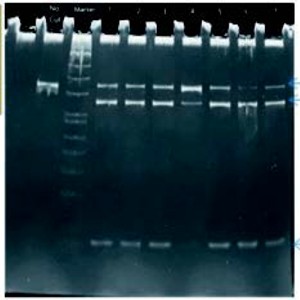Protein tyrosine phosphatase non-receptor type 22 C1858T gene polymorphism in children with Down syndrome and autoimmune thyroid diseases

Submitted: 19 January 2022
Accepted: 28 December 2022
Published: 22 February 2023
Accepted: 28 December 2022
Abstract Views: 863
PDF: 417
HTML: 18
HTML: 18
Publisher's note
All claims expressed in this article are solely those of the authors and do not necessarily represent those of their affiliated organizations, or those of the publisher, the editors and the reviewers. Any product that may be evaluated in this article or claim that may be made by its manufacturer is not guaranteed or endorsed by the publisher.
All claims expressed in this article are solely those of the authors and do not necessarily represent those of their affiliated organizations, or those of the publisher, the editors and the reviewers. Any product that may be evaluated in this article or claim that may be made by its manufacturer is not guaranteed or endorsed by the publisher.
Similar Articles
- E. D’Auria, S. Palazzo, S. Argirò, S. El Oksha, E. Riva, Primary ciliary dyskinesia: clinical and genetic aspects , La Pediatria Medica e Chirurgica: Vol. 34 No. 3 (2012)
- M. Mandelli, L.G. Semeraro, L. Brunetti, P. Poli, M. Giovannini, A challenge for pediatrician: non allergic urticaria , La Pediatria Medica e Chirurgica: Vol. 35 No. 6 (2013)
- Chiara Peila, Alessandra Coscia, Paola Tonetto, Elena Spada, Silvano Milani, Guido Moro, Carlotta Fontana, Liliana Vagliano, Claudia Tortone, Elisa Di Bella, Enrico Bertino, Evaluation of the galactogogue effect of silymarin on mothers of preterm newborns (<32 weeks) , La Pediatria Medica e Chirurgica: Vol. 37 No. 3 (2015)
- Ivan Ivanovski, Livia Garavelli, Olivera Djurić, Aleksandar Ćirović, Dejan Škorić, Petar I. Ivanovski, Mitotic crossover promotes leukemogenesis in children born with TEL-AML1 via the generation of loss of heterozygosity at 12p , La Pediatria Medica e Chirurgica: Vol. 37 No. 2 (2015)
- Marco Gasparella, Maurizio Marzaro, Mario Ferro, Carlo Benetton, Vittorina Ghirardo, Cinzia Zanatta, Francesco Zoppellaro, Meckel’s diverticulum and bowel obstruction due to phytobezoar: a case report , La Pediatria Medica e Chirurgica: Vol. 38 No. 2 (2016)
- Edoardo Bindi, Fabiano Nino, Francesco Pierangeli, Michele Ilari, Taisia Bollettini, Elisa Chiarella, Francesca Mariscoli, Gianluca Gentilucci, Alba Cruccetti, Giovanni Cobellis, Transumbilical laparoscopic-assisted appendectomy versus laparoscopic appendectomy in children: a single center experience , La Pediatria Medica e Chirurgica: Vol. 45 No. 1 (2023)
- Fabio Mosca, Maria Lorella Giannì, Human milk: composition and health benefits , La Pediatria Medica e Chirurgica: Vol. 39 No. 2 (2017)
- Gianluca Lista, Fabio Meneghin, Ilia Bresesti, Francesco Cavigioli, Nutritional problems of children with bronchopulmonary dysplasia after hospital discharge , La Pediatria Medica e Chirurgica: Vol. 39 No. 4 (2017)
You may also start an advanced similarity search for this article.

 https://doi.org/10.4081/pmc.2023.283
https://doi.org/10.4081/pmc.2023.283




